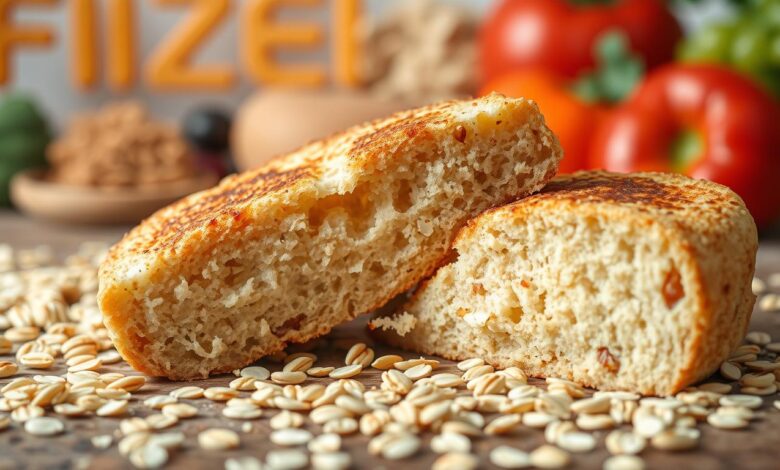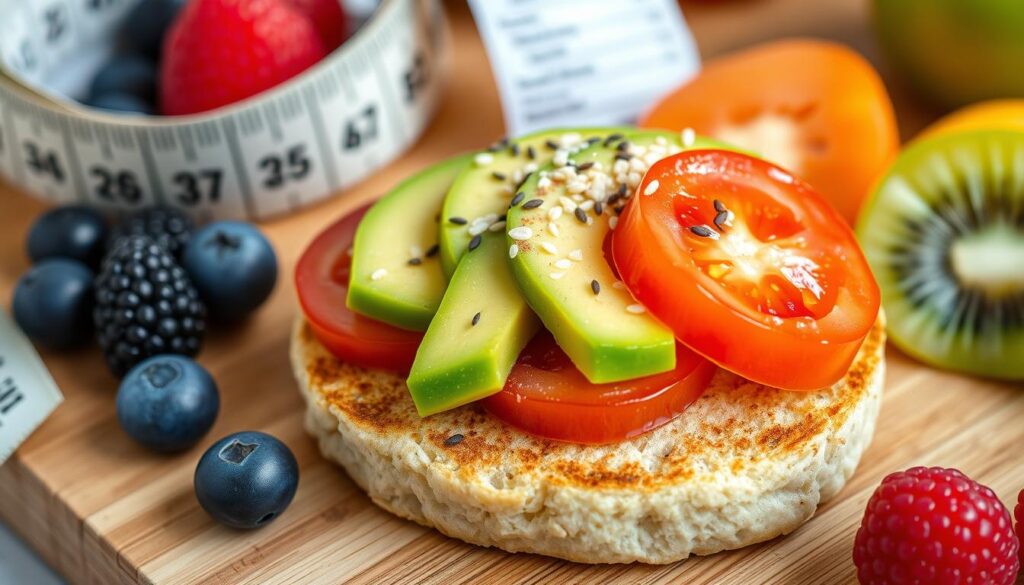
Carbs in English muffin and their nutritional value
English muffins are a favorite for breakfast. They are easy to carry and full of nutrients. Knowing what’s in them can help you start your day right.
Table of Contents
Understanding English Muffin Basics and Their Popularity
The whole wheat english muffin is a favorite in American breakfasts. But, have you ever thought about its history? Let’s explore the story of the gluten-free english muffin and why it’s loved for so long.
History of English Muffins in American Cuisine
The English muffin started in 19th-century England as the “toasted crumpet.” It quickly became popular and came to the United States. In the late 1800s, American bakers made their own version, which we know today.
Different Types of English Muffins Available
- Traditional Whole Wheat English Muffin: Made from whole wheat flour, providing a hearty and nutritious base for your breakfast.
- Gluten-Free English Muffin: A popular option for those with gluten sensitivities or dietary restrictions, offering a delicious alternative without compromising taste or texture.
- Sourdough English Muffin: A unique twist on the classic, with a tangy and slightly sour flavor profile.
- Multigrain English Muffin: Featuring a blend of whole grains for added nutritional value and a delightful crunch.
Why English Muffins Remain a Breakfast Staple
English muffins are loved for their versatility and convenience. They can be toasted with jam, topped with eggs, or used in breakfast sandwiches. Their size, texture, and customization options make them a staple in American homes.
“The English muffin is a true breakfast icon – its perfect balance of toasted crispness and fluffy interior makes it a versatile and satisfying choice for any morning meal.”
Carbs in English Muffin: A Comprehensive Breakdown
Assessing the nutritional value of an English muffin, we find carbs are key. These breakfast staples are mostly carbs, which give us energy. Let’s explore the carbs in an English muffin and their role in our diet.
English muffin carbs fall into two groups: simple carbs and complex carbs. Simple carbs, or refined carbs, are quickly digested sugars. They give a quick energy boost. Complex carbs, or whole-grain carbs, take longer to digest and provide sustained energy.
| Carbohydrate Type | English Muffin (1 serving) |
|---|---|
| Total Carbohydrates | 25g |
| Simple Carbs (Sugars) | 2g |
| Complex Carbs (Starches) | 23g |
| Fiber | 3g |
A single English muffin has a lot of carbs, mostly complex carbs like starches. These carbs give us steady energy and keep us full. English muffins also have a good amount of fiber, which is good for our digestive health.
The carbs in an English muffin make up most of its macros, about 75-80%. The rest is mostly protein and a bit of fat, depending on the type and toppings.
Knowing the carb makeup of English muffins is important for those watching their carb intake. This knowledge helps in planning meals that fit a balanced diet.
Essential Nutritional Components of English Muffins
English muffins are more than just carbs. They have important nutrients that help keep you healthy. Let’s explore these key nutrients and how they benefit your health.
Protein Content and Quality
English muffins have about 4-5 grams of protein per serving. This protein is high quality, with all the amino acids your body needs. It supports muscle growth, repair, and body functions.
Fat Content and Types
English muffins have only 2-3 grams of fat per serving. Most of this fat is from good unsaturated sources like vegetable oils. These fats are good for your heart and cholesterol levels.
Fiber and Digestive Benefits
English muffin nutrition shines with its fiber content. A high-fiber english muffin gives you 4-5 grams of fiber. This fiber aids digestion, supports gut health, and helps control blood sugar.
Adding English muffins to your diet can make breakfast healthier. They offer a balanced mix of nutrients for your well-being.
Calories and Macronutrient Distribution
English muffins have different calorie counts based on their type and brand. A typical store-bought one has about 130-150 calories. But what really matters is how these calories are split among carbs, proteins, and fats.
Here’s what an english muffin usually has:
- Carbohydrates: 25-30 grams
- Protein: 4-6 grams
- Fat: 1-3 grams
Most of an english muffin’s calories come from carbs. This makes them a high-carb food. The protein and fat are less, affecting the overall balance of macros.
| Macronutrient | Amount per English Muffin | Percentage of Total Calories |
|---|---|---|
| Carbohydrates | 25-30 grams | 75-80% |
| Protein | 4-6 grams | 10-15% |
| Fat | 1-3 grams | 5-10% |
Knowing the english muffin calories and macronutrient breakdown is key for a balanced diet. They’re high in carbs, so not ideal for low-carb or keto diets. But, they can fit into a healthy diet when eaten in moderation.
Whole Wheat vs. White English Muffins: Nutritional Comparison
Choosing between whole wheat and white English muffins can affect your nutrition. Knowing the differences in carbs, fiber, and vitamins can help you pick the right one for your health goals.
Carbohydrate Differences
Whole wheat English muffins have more carbs than white ones. This is because whole grain flour adds complex carbs. These carbs are digested slowly, giving you steady energy and helping control blood sugar.
Fiber Content Variation
Whole wheat English muffins have a lot more fiber than white ones. They often have double or triple the fiber. This can improve digestion and make you feel fuller.
Vitamin and Mineral Profiles
Whole wheat English muffins also have more vitamins and minerals. They have more B vitamins, iron, and magnesium than white ones. This makes them a better choice for your overall health and daily nutrient needs.
When picking between whole wheat and white English muffins, think about what’s important to you. Whole wheat muffins are healthier because of their fiber and nutrients. Adding whole grain and high-fiber English muffins to your diet can make it more balanced and nutritious.
Low-Carb and Keto-Friendly English Muffin Alternatives
If you’re on a low-carb or ketogenic diet, traditional English muffins might not be right. But, there are tasty alternatives that fit your diet needs. These options taste and feel like regular English muffins but have fewer carbs.
Homemade Low-Carb English Muffins
Making your own low-carb english muffin is a great idea. You can use almond flour, coconut flour, or cheese. This way, you get a similar taste and texture but with less carbs. Plus, you can adjust the recipe to your liking.
Store-Bought Keto-Friendly English Muffin Options
- Joseph’s Flax, Oat Bran, and Whole Wheat English Muffins: These are low in carbs and high in fiber, perfect for keto or low-carb diets.
- Unbun Foods Keto English Muffins: Made with almond flour and egg whites, they’re a keto-friendly take on the classic breakfast item.
- BFree Keto Savory Muffins: With coconut flour, psyllium husk, and other low-carb ingredients, they’re a tasty choice for keto fans.
When looking at these low-carb english muffin and keto-friendly english muffin options, check the nutrition facts. Look at carbs, fiber, and protein to make sure they fit your diet.

Choosing these low-carb and keto-friendly English muffin alternatives lets you enjoy familiar tastes and textures. With a bit of searching, you’ll find the ideal replacement that meets your dietary needs and supports your health.
Health Benefits and Potential Concerns
Adding gluten-free english muffins or low-carb english muffins to your diet has both good and bad sides. Let’s dive into these points.
Blood Sugar Impact
English muffins can affect your blood sugar. But, how much depends on the flour type and the muffin’s nutrients. Whole wheat english muffins are better because they don’t raise blood sugar as much as white flour ones.
Weight Management Considerations
The calories and carbs in english muffins matter for those watching their weight. They can be a good part of a healthy diet if eaten in the right amounts. For those on a low-carb diet, low-carb english muffin options might be better.
Gluten Sensitivity Issues
People with gluten issues can’t eat regular english muffins because they’re made with wheat. But, there are gluten-free english muffin choices now. These let those with gluten problems still enjoy this breakfast favorite.
Knowing the health ups and downs of english muffins helps you use them wisely. This way, you can fit them into your diet without harming your health goals or dietary needs.
How to Include English Muffins in a Balanced Diet
English muffins can add flavor and variety to your meals. To get the most health benefits, control your portion sizes and choose toppings that are good for you. Let’s look at how to make the most of english muffin nutrition and manage carbs in english muffin for a healthy diet.
Begin your day with a whole-wheat or multigrain English muffin. Add a poached egg, avocado, and herbs for a breakfast full of protein and fiber. For a savory choice, spread nut butter or hummus on your muffin, then add sliced tomatoes and feta cheese.
For a light lunch or snack, cut an English muffin in half. Use it as a base for an open-faced sandwich with grilled veggies, lean protein, and balsamic glaze. This way, you enjoy the muffin’s taste and texture without overeating.
- Pair an English muffin with a side salad or vegetable soup for a well-balanced meal.
- Use an English muffin as a base for a mini pizza, topping it with tomato sauce, fresh mozzarella, and your favorite veggies.
- Transform an English muffin into a breakfast sandwich by adding a fried egg, lean turkey or Canadian bacon, and a slice of cheese.
While english muffin nutrition is good for you, remember to balance your meals. Combine the carbs from the muffin with lean proteins, healthy fats, and fiber-rich fruits and veggies. This will help you stay full and satisfied.

Conclusion
Understanding the carbs and nutrients in English muffins is key when adding them to your diet. Knowing the carb, protein, and fiber content helps you make choices that meet your health goals.
Choosing between whole wheat and white English muffins depends on your dietary needs. They are a favorite for breakfast, but remember to keep portion sizes in check. This ensures they fit into a healthy eating plan.
It’s important to note that the carbs in english muffin and english muffin nutrition can differ. Always check the labels and consider your dietary needs. This way, you can enjoy English muffins as part of a balanced diet that promotes your health.
FAQ
What is the carbohydrate content in an English muffin?
The carbs in an English muffin depend on the brand and type. On average, a standard muffin has about 24-27 grams of carbs.
How do the carbs in an English muffin stack up nutritionally?
English muffins have complex carbs for steady energy. They also have a bit of simple sugars. These carbs are key to a balanced diet, but watch your portion sizes.
What is the calorie count of an English muffin?
A typical English muffin has 130-150 calories. The exact calories can change based on the brand, ingredients, and type of muffin.
Are there any low-carb or keto-friendly English muffin options available?
Yes, there are low-carb and keto-friendly English muffin options. They use flours like almond or coconut to cut down carbs, making them good for low-carb or keto diets.
How do whole wheat English muffins differ from white English muffins in terms of nutrition?
Whole wheat muffins have more fiber, vitamins, and minerals than white ones. They also have less carbs and more complex carbs. The extra fiber in whole wheat muffins can help with digestion.
Are English muffins a good choice for individuals with gluten sensitivity or celiac disease?
Traditional English muffins have gluten because they’re made with wheat flour. But, there are gluten-free options for those with gluten sensitivity or celiac disease. These are made with gluten-free flours and are safe for gluten-free diets.



